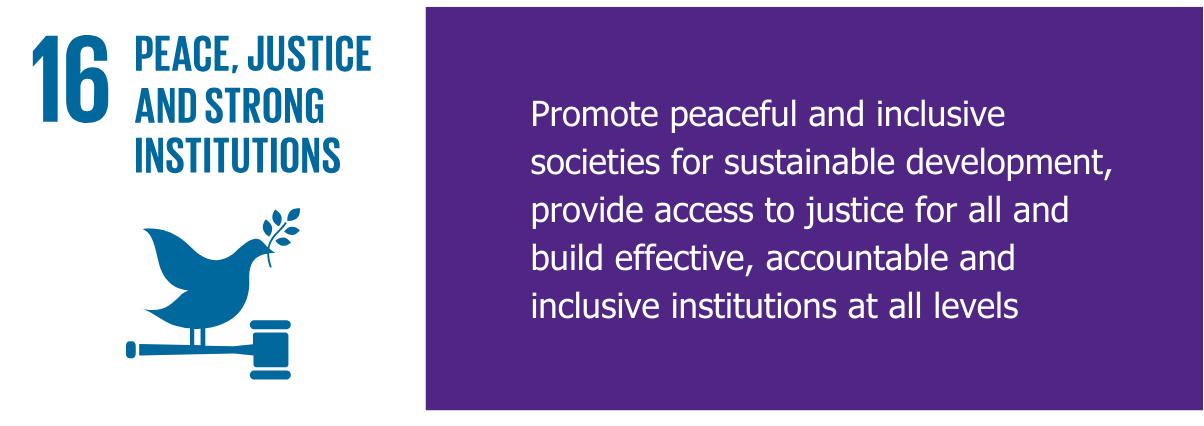SDG 16 - Strategic Initiatives
Advice to Government
Western University provides expert advice to local, regional, and national governments through policy guidance, committee participation, and collaborative research initiatives. This engagement spans multiple faculties, research centres, and strategic partnerships.
Local
- Board of Governors: Includes the Mayor of London, the County of Middlesex Councillor, and two appointees from the City of London Council, ensuring direct input from municipal leadership.
- City of London Local Government Program: Offers specialized education in local administration and policy analysis specific to our local community, contributing to informed municipal governance.
- Local Government Program: Partners directly with the City of London and other municipalities to conduct applied research on local policy issues. For example, Master of Public Administration students have collaborated with the Office of the Mayor on projects related to downtown revitalization and public safety. Faculty members also produce research and policy analysis on topics such as housing, municipal governance, and climate impact, which are shared with local officials and the broader public.
- London & Middlesex Local Immigration Partnership Council: Includes a community partner seat for Western to contribute to research and policy insights on immigration and settlement.
Regional
- Local Government Conference - Municipal Eras: This conference engaged existing municipal working professionals, anyone involved in or aspiring to work in municipal government, and any organization interacting with local government in policy dialogue and training.
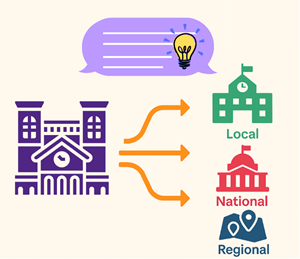
- Racism and Discrimination in Southwestern Ontario: Western contributed policy insights into a collaboration with five Local Immigration Partnerships in London, Niagara, Oxford, Sarnia-Lambton, and St. Thomas-Elgin.
- Speaker Series: Events are open to the public, addressing a wide range of issues such as ‘Protection of Privilege – The Segregation of Public Schools through Land Use Regulations’ and ‘Understanding Immigrant Outcomes in a [Very] Unequal World – Methodological and Substantive Research on Immigrant Selection’.
- Starling Centre for Just Technologies and Just Societies: The Faculty of Information & Media Studies launched its first research centre dedicated to media and journalism studies. The centre supports evidence-based policy development by examining the role of media in democracy, public discourse, and civic engagement, contributing to both regional and national conversations on media regulation and freedom of expression.
- Understanding and Counteracting Incivility in Canadian Municipal Politics: Through Ivey Executive Education, Western researchers provide insights into the causes and consequences of incivility in municipal politics. This work supports local and regional governments by offering strategies to foster respectful political discourse and improve democratic engagement.
National
- Centre for Urban Policy and Local Governance: Facilitates interdisciplinary collaborations and dialogue between academics, policy practitioners, and the broader public. Initiatives like Power and Purpose: Canadian Municipal Law in Transition bring together city leaders, government officials, academia, civil society, and the private sector to address major urban challenges in Canada.
- Hate Indicators: Involves collaboration amoung Western researchers and the Canadian Race Relations Foundation to develop a searchable database of Canadian hate crime case law. This tool provides legal professionals, policymakers, and community advocates with accessible evidence to inform policy development and legal reform at the national level.
- Ivey Energy Policy and Management Centre: Provides policy guidance to the government through evidence-based research, forums, workshops, educational initiatives, and advisory roles. As an example, feedback was submitted to the Electrification and Energy Transition Panel as part of its mandate to shape energy policy through informed evidence-based analysis.
- Ivey Lawrence National Centre for Policy and Management: Provides a forum for business and government to discuss and debate policy issues. Events and programs such as a brief on Blockchains, Cryptocurrencies, & NFTs in the Gaming Industry and a conference on Comparative Perspectives on Broadband Regulation and Access help shape public policy in a changing technological landscape.
- Local Democracy Project: Conducts a national examination of election processes across Canadian provinces to support data-driven policy improvements.
- Network for Economic and Social Trends: Uses advanced data creation, management, and analytic techniques to conduct theoretically driven and evidenced-based research that will inform social and economic policy and practices in Canada and North America more broadly.
The Government Relations Department at Western University demonstrates our commitment to collaborating with the municipal government in the City of London, the provincial government in Ontario, and the federal government of Canada. Under the leadership of Alex Irving, Executive Director of Government Relations, we strive to enhance relationships and develop comprehensive approaches to policy issues.
Elected Representation
Western University has a bicameral governance structure, consisting of two governing bodies: the Board of Governors and the Senate. Both include democratically elected representation from undergraduate and graduate students, faculty, and administrative staff.
- Board of Governors: The Board is responsible for the administrative and financial management of the university. It oversees the institution’s business affairs, including approving budgets, appointing senior administrators, and ensuring the university’s overall strategic direction. Election procedures specify the inclusion of two faculty members, two administrative staff members, two undergraduate students, and one graduate student. See our current membership.
- Senate: The Senate is responsible for academic matters. It has authority over educational policies, academic standards, curriculum development, and research priorities. The Senate ensures that the university maintains high academic standards and addresses the needs of students and faculty. Senate election procedures specify the inclusion of 48 faculty members, two administrative staff members, 14 undergraduate students, and 4 graduate students. See our current membership.
Student Unions
Western University recognizes two independent student unions which are democratically governed, with leadership elected by student vote:
- University Student Council (USC):
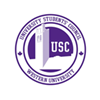 An elected student union that represents all undergraduate students at Western University. Operating since 1965, USC has grown into one of the largest student governments in Canada and one of the largest non-profits in London. Incorporated under the Ontario Non-profit Corporations Act, the USC Charter upholds democratic elections. USC is currently looking to join the Canadian Alliance of Student Associations.
An elected student union that represents all undergraduate students at Western University. Operating since 1965, USC has grown into one of the largest student governments in Canada and one of the largest non-profits in London. Incorporated under the Ontario Non-profit Corporations Act, the USC Charter upholds democratic elections. USC is currently looking to join the Canadian Alliance of Student Associations. - Society of Graduate Students (SOGS):
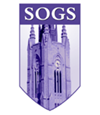 A democratic student government that entrusts elected Executive Officers and Council members with running the Society’s day-to-day and long-term affairs. SOGS Council represents graduate students in all faculties and departments at Western University. SOGS joined the Canadian Federation of Students, Canada’s largest student union and advocacy organization, as Local 47 in the 1980s.
A democratic student government that entrusts elected Executive Officers and Council members with running the Society’s day-to-day and long-term affairs. SOGS Council represents graduate students in all faculties and departments at Western University. SOGS joined the Canadian Federation of Students, Canada’s largest student union and advocacy organization, as Local 47 in the 1980s.
Both student-led unions advocate for and represent students at Western University. They provide:
- Governance Input: USC and SOGS provide formal input into university governance through representation on committees and advisory bodies, and regular consultation with university leadership.
- Support for Students: USC and SOGS both offer a wide range of services, including academic advocacy, health and wellness resources, and financial support programs.
- Social Activities: USC and SOGS organize numerous social, cultural, and recreational events throughout the year for their respective student populations.
Local Stakeholder Engagement and Participation
Western has policies and procedures to identify and engage with local stakeholders, including residents, local government, and civil society representatives in the governance and decision-making of the university.

- Community & Stakeholder Engagement and Partnership: The Schulich School of Medicine & Dentistry commits to creating a structured and purposeful partnership with our communities and health care structures—an environment that is collaborative, interdependent, and reciprocal. By embedding collaborative models of care, we actively engage with, learn from, and contribute to our regional communities to address priority health care and social needs in these communities.
- Government Relations Department: This department strives to foster strong connections with all three levels of government and our strategic community partners. It serves as the primary connection between the university and various levels of government. The office proudly works with government officials and strategic partners to further Western’s positive impact on the local community and country.
- People, Community, and Culture: Western’s strategic plan, Towards Western at 150, commits to unite our community through a sense of belonging for all students, faculty, staff, and alumni. Western also commits to craft pathways with local and regional school boards and other community organizations to increase our opportunities to recruit students from equity-deserving groups.
- University of Western Ontario Act: The Act requires the following:
- Board of Governors must include as members the mayor of the City of London (or designate), the warden of the County of Middlesex (or designate), and two persons appointed by the council of the City of London.
- Senate must include as members five persons from the general community, one of whom shall be active in or associated with the field of secondary school education.
Academic Freedom
Western has policies supporting and protecting academic freedom for research and teaching. The policies apply equally to all members of the academic community regardless of role, status, age, or any other personal or professional characteristics, including junior and senior academics.

- Policy 1.38 Rights and Responsibilities of Academic Freedom:
- Research: Academics frequently express ideas that are at odds with other views within the university, and sometimes with the views of society or government. Academic freedom ensures that such ideas can be expressed without fear of interference or repression from university administrators, politicians, or others. Members of the academic community have responsibilities as well as rights, and they are individually accountable, in both the moral and social sense, for their findings and statements.
- Teaching: Academic checks and balances also apply to teaching. As in research, so in the classroom, there are freedoms and responsibilities. Faculty members have the responsibility to make a balanced presentation of controversial issues. They have the further responsibility to teach their students to evaluate what is presented to them in a critical way.
- Policy 1.54 Freedom of Expression: Freedom of expression is essential to the pursuit of truth, the advancement of learning and the dissemination of knowledge. All members of the university community, including guests and visitors, have the right to freedom of expression, which includes the right to examine, represent, question, advocate for, and comment on any issue without reference to prescribed doctrine. It also includes the right to criticize the university and society at large.
Safe Space
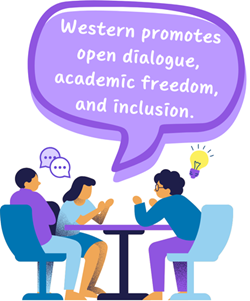
Western provides a neutral platform and safe space for different political stakeholders to discuss challenges openly. We affirm the principle of academic freedom to ensure that ideas can be expressed without fear of interference or repression from university administrators, politicians, or others.
Our Freedom of Expression Policy states: All members of the University community, including guests and visitors, have the right to freedom of expression, which includes the right to examine, represent, question, advocate for and comment on any issue without reference to prescribed doctrine. It also includes the right to criticize the University and society at large.
- Centre for Transitional Justice and Post-Conflict Reconstruction: This centre convenes interdisciplinary experts to tackle politically sensitive topics like democracy, the environment, the economy, human rights, politics, and peace agreements. It hosts events to facilitate neutral, informed dialogue among stakeholders, supporting academic freedom and constructive political engagement.
- Commitment to Diversity and Inclusion: Western promotes inclusive dialogue across political and social issues, ensuring all voices are heard and respected.This commitment helps create safe spaces for diverse stakeholders to engage in open, meaningful conversations without fear of marginalization.
- Department of Political Science: Through lectures, panels, and public events, the department facilitates open discussion on political theory and current affairs. These forums encourage respectful debate and help students and scholars engage with differing political perspectives.
- Expert Commentary on Political Stress: Professor Amanda Friesen’s research on political psychology informs public understanding of political stress. Her work encourages respectful discourse and local engagement, helping citizens navigate political tensions constructively and empathetically.
- Office of the Ombudsperson: This student support office provides a confidential, impartial space for students to raise concerns and engage in respectful dialogue. This supports fair discourse and reinforces Western’s commitment to academic freedom and open expression.
- Reconciling Business Schools Workshop: Hosted by Ivey Business School, this five-day workshop created a safe space for dialogue around the Truth and Reconciliation Commission’s Calls to Action, engaging diverse voices in meaningful discussions on institutional change and reconciliation.
- Student Advocacy for Divestment: Students advocated for Western to divest, submitting an open letter to the president and Board of Governors. In response, Western has committed to reviewing its Responsible Investing Policy and gathering community feedback. Their campaign included peaceful demonstrations, exemplifying Western’s role as a neutral platform for political dialogue and student-led activism.
- Western Debate Society: This club offers students a structured environment to explore and challenge political ideas. It promotes respectful discourse and critical thinking, helping participants engage with opposing viewpoints in a neutral academic setting.
- Western Model United Nations: This student-led initiative simulates global diplomacy, allowing participants to represent diverse political positions. It cultivates open dialogue, negotiation, and understanding of complex political challenges in a safe, educational environment.
Knowledge Sharing with Policymakers
Western provides outreach, general education, upskilling, and capacity building to policy- and lawmakers at the local, regional, and national levels. These initiatives span key areas such as economics, law, technology, migration and displacement, and climate change, and are delivered through formal academic programs, professional development workshops, speaker series, and collaborative research.
- Centre for Transitional Justice and Post-Conflict Reconstruction (TJC): TJC eeks to address the complex challenge of rebuilding democratic institutions, in post-conflict societies. TJC explores development, democracy, policy, law, the environment, the economy, human rights, politics, peace agreements, and justice before, at the time of, and post-transition.
- Speaker Series: Invites guest speakers to address these issues. The events are shared on YouTube for all to view.
- Panel Discussions, Workshops, and Seminars: Address the impact of war, the legal landscape, and human rights and accountability.
- Undergraduate Minor or Collaborative Graduate Specialization in Transitional Justice and Post-Conflict Reconstruction: Familiarizes students with the emerging debates surrounding transitional justice and post-conflict reconstruction, and provides real-world application of theoretical constructs and explanations relating to development, democracy, the environment, the economy, human rights, politics, displacement and diasporas, peace agreements, and justice before, at the time of, and post-transition.
- Digital Preservation: Western Libraries plays a key role in preserving public-interest data through its web archiving initiatives, ensuring that scholarly and public-interest content is captured and made accessible for future research and policy analysis. Western also participates in the Canadian Public Data Rescue Initiative, a national initiative which aims to safeguard Canadian government data at risk of loss or deletion. Western’s librarians and data professionals contribute to data scraping, documentation, and long-term curation strategies. These efforts ensure that critical datasets remain accessible to researchers, policymakers, and civil society, supporting evidence-informed decision-making and public accountability.
- John & Dotsa Bitove Family Law Library: Western’s Law Library supports legal education and outreach by providing access to extensive legal resources for students, faculty, researchers, and community members. These materials enable informed engagement with policy and lawmaking processes. By supporting legal scholarship and public understanding of justice systems, the library contributes to capacity-building for future policymakers, legal professionals, and community advocates.
- Lawrence National Centre for Policy and Management: There is a substantial gap in the understanding between what business leaders know about public policy issues and what government decision makers know about business imperatives and competitive advantage. This independent public policy centre bridges the gap between business and government.
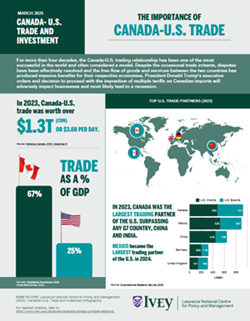
- Senior Public Sector Leader Program: This is a comprehensive, results-driven leadership development initiative designed to cultivate and enhance the skills of senior leaders in Canada’s public sector. This program equips you with the necessary tools, knowledge, and competencies to navigate the complex public administration environment, enabling you to lead more effective teams and inspire successful outcomes in any context.
- Innovation and Telecommunications Policy—Shaping Tech, Markets & Networks: This workshop focused on developing policies and strategies that support digital infrastructures, innovation, and economic progress, which are crucial for Canada and other countries, in the wake of globalization, disruption, and geopolitical challenges.
- New Frontiers for Broadband and Resilience in Telecommunications: This workshop focused on the critical role of non-terrestrial networks, including various applications of satellite and direct-to-device integration, enhancing network resilience and security, providing new business models, raising new regulatory challenges, and bridging the digital divide.
- Enhancing Canada’s AI Advantage in a Competitive and Uncertain World: How can industry action and government policy enhance the scaling of AI innovations, and do so responsibly, thereby enabling Canada to sustain its early advantage in AI amidst fierce global competition? This question and more were the topics of the symposium that convened leading policy experts, business executives, and thought leaders.
- Local Government Program: Celebrating its 50th anniversary in 2024, Western’s LGP is Canada’s only graduate public administration program specializing in local government.
- Master of Public Administration: This program is designed for both mid-career local government officials aiming to broaden their perspective and advance their skills and future professionals seeking careers in municipal government.
- Graduate Diploma in Public Administration (GDPA): Targeted at working local government professionals, GDPA provides specialized education in local administration and policy analysis.
- City of London Graduate Diploma in Public Administration: The City of London partners with Western to offer the GDPA program to their employees.
- Network for Economic and Social Trends (NEST): NEST uses advanced data creation, management, and analytic techniques to conduct theoretically driven and evidenced-based research that will inform social and economic policy and practices in Canada and North America more broadly.
- Speaker Series: Events are open to the public, addressing a wide range of issues such as ‘Protection of Privilege – The Segregation of Public Schools through Land Use Regulations’, ‘Understanding Immigrant Outcomes in a [Very] Unequal World – Methodological and Substantive Research on Immigrant Selection’.
- Master in Research for Policy and Evaluation: This program develops quantitative and qualitative research skills for practical applications in policy and program development.
- WeCLISH Climate Café: Join this free monthly conversation on climate change, featuring a new guest speaker each session. Anyone engaged in climate justice, research, policy, advocacy, or action is invited to discuss inspiring, evidence-informed climate change conversations.
- Pathways to Prosperity (P2P) Canada Project: Western is a founding partner in the Pathways to Prosperity alliance, a national initiative that supports evidence-based policymaking on migration, settlement, and integration. The project brings together researchers from over 50 universities, government ministries, municipalities, and civil society organizations. Western contributes through primary and secondary research, policy analysis, and knowledge mobilization activities focused on newcomer integration, rural and northern migration, and Francophone minority communities. The university’s involvement helps inform federal, provincial, and municipal policies through empirically grounded insights and best practices.
- Pro Bono Students Canada: Western’s Pro Bono Students Canada chapter connects law students with community organizations to provide free legal support under faculty supervision. These projects help non-profits navigate legal systems, develop policies, and understand rights and responsibilities. By offering practical legal assistance and fostering civic engagement, the program builds capacity among community leaders and supports informed participation in lawmaking and policy development processes.
- Public Policy Forum (PFF): As a member of Universities Canada, Western helps inform Canadian policy through this independent, non-partisan think tank dedicated to improving Canadian policymaking. PPF provides a neutral platform for dialogue among government, academia, industry, and civil society. Western contributes research insights and participates in frank, inclusive discussions that inform policy development on issues such as economic growth, technology, climate change, and governance.
- Science Meets Parliament: Western University actively participates annually in the Science Meets Parliament program, which connects researchers with policymakers to promote evidence-informed decision-making. In 2025, Western had the highest representation among selected Ontario institutions, with 18.8% of all delegates coming from Western. This engagement allows Western scholars to share expertise on topics such as climate change, technology, health, and public policy directly with members of Parliament and provincial legislators, contributing to capacity-building and outreach at both the national and provincial levels.
Public Financial Reporting
Western University publishes university financial data publicly, ensuring transparency and accountability in its financial operations.
- Corporate Financial Reporting: Financial statements, reports, and information returns are prepared for various end users and governing bodies. These include, but are not limited to:
- Office of Institutional Planning & Budgeting (IPB): IPB is responsible for and publishes:
These reports are prepared in accordance with generally accepted accounting principles and are sufficient for assessing the financial probity and viability of the institution.
Policy-Focused Research

Western University undertakes policy-focused research in collaboration with government departments at the local, provincial, and federal levels. These partnerships support evidence-informed decision-making and address pressing public policy challenges.
- Centre for Urban Policy and Local Governance: This centre brings together academic researchers and students, from across Western and beyond, to facilitate interdisciplinary collaborations to address pressing issues and emerging challenges faced by local governments and urban policymakers.
- Local Government and the Changing Urban-Rural Interplay (LoGov-RISE Project): This project studies the responsibilities of different levels of government, financial arrangements, and public participation in relation to the growing gap between urban and rural settlements, identifying innovative practices to respond to these challenges.
- Power and Purpose – Canadian Municipal Law in Transition: This project brings city leaders together with other levels of government, academia, civil society, and the private sector to identify actionable and scalable solutions to the biggest challenges facing Canada’s cities.
- Canadian Urban Politics Workshops: These provide faculty and student researchers with an opportunity to receive high-quality, extended feedback on research papers related to urban politics, while also enabling faculty and students to keep in touch with upcoming research in urban political science.
- Collaborative Agreement with Canadian Nuclear Laboratories (CNL) and Atomic Energy of Canada Limited (AECL): Western signed a Memorandum of Understanding with CNL and AECL to advance collaborative research in areas such as clean energy, nuclear safety, cybersecurity, and radiopharmaceuticals. This partnership supports national policy development and innovation through joint research, knowledge mobilization, and strategic alignment with Canada’s Vision 2030 for nuclear science and technology.
- Ivey Energy Policy and Management Centre: This centre provides a transparent and reliable forum for industry, government, academia, and interested stakeholders, to discuss and exchange ideas on energy sector development and policy.
- Policy Briefs: Briefs provide in-depth analyses and recommendations pertinent to stakeholders in the energy sector, policymakers, and academics interested in the governance, economic impact, and environmental considerations of energy infrastructure in Canada.
- Academic Papers: These papers contribute to energy policymaking through the production and dissemination of evidence-based research and analysis on major policy issues affecting the electricity, gas, oil, and pipeline sectors in Canada.
- Lawrence National Centre for Policy and Management: There is a substantial gap in the understanding between what business leaders know about public policy issues and what government decision makers know about business imperatives and competitive advantage. This independent public policy centre bridges the gap between business and government.
- Research: This section includes policy briefs on broadband access, debt cycles, workplace gender diversity, cryptocurrencies, and more.
- Canada-U.S. Trade Relations: Active research involves Trump’s Tariffs – Making Sense of the Senseless, and research-backed discussions about the best policy responses.
- RECAP – Research Engagement Collaborative Alliance with Partners: Western launched the RECAP program to support researchers in building meaningful partnerships with non-academic stakeholders, including government departments. Funded through Western’s Strategic Priorities Fund, RECAP provides training modules and engagement events to help researchers co-develop projects that address societal challenges. The initiative fosters inclusive, impact-driven research collaborations that inform public policy and strengthen institutional ties with government and civil society.
- Schulich School of Medicine & Dentistry: This faculty engages in policy-focused research in collaboration with government departments, particularly through its research enterprise and affiliated institutes.
- Affiliated Institutes: Schulich collaborates with organizations like the Lawson Health Research Institute, London Health Sciences Centre, and Robarts Research Institute, many of which conduct research that informs health policy and practice in partnership with provincial and federal health departments.
- Partnerships: Schulich commits to strengthening partnerships with government, industry, and community organizations to ensure its research is impactful and aligned with societal needs, supporting evidence-based policy development and public health advancement.
- Research Excellence and Expansion: Schulich is actively expanding its research capacity to have greater impacts on health outcomes, which involves working with government agencies on public health and health systems research.
Principles on Corruption and Bribery
Western University is committed to openness and transparency in all our operations. Messages from the president and the board chair emphasize the importance of public accountability, which are enshrined in Western’s publicly available strategic plan, Towards Western at 150, which outlines commitments to diversity, equity, inclusion, respect, and ethical leadership across all areas of university life.
As part of this commitment, Western firmly opposes corruption and bribery. The university has published policies and procedures that apply institution-wide and are designed to prevent and address unethical practices:
- Conflicts of Interest Policy: Requires all members of the university community to disclose any personal, financial, or professional interests that could conflict with their university responsibilities. The policy ensures that decisions are made objectively and in the best interest of the university, free from undue influence or bias.
- Gift Acceptance Policy: Outlines the principles for accepting gifts to ensure they align with Western’s values and strategic priorities. The policy prohibits gifts that could improperly influence decision-making or compromise the university’s integrity, and requires transparency and accountability in all gift-related transactions.
- Internal Audit: Provides independent and objective assurance and consulting services designed to add value and improve university operations. It helps ensure that Western’s governance, risk management, and internal control processes are effective and aligned with ethical standards. The department plays a key role in detecting and preventing fraud, corruption, and misconduct, reinforcing Western’s commitment to integrity and accountability.
- Oversight & Compliance: Western ensures a robust framework for ethical oversight through the Office of Human Research Ethics and associated compliance bodies. These offices ensure that all research involving human participants adheres to the highest standards of integrity, transparency, and accountability. The university’s ethics boards and compliance structures help prevent misconduct, fraud, and unethical practices, and reinforce Western’s commitment to responsible conduct in research and institutional decision-making.
- Safe Disclosure Policy and Associated Procedures: Protect individuals who report concerns related to bribery, fraud, embezzlement, forgery, and other corrupt practices. This policy ensures confidentiality and safeguards against retaliation.
- Supplier Code of Conduct: Extends Western’s ethical standards to external partners. It includes clear expectations regarding anti-corruption and anti-bribery practices:
- The supplier shall not, directly or indirectly, pay, give, offer, or promise anything of value to any local or foreign government official (or to any person for the benefit of a government official) for the purpose of corruptly causing the government official to improperly act or use his or her influence in obtaining or retaining any business.
- The supplier shall not, directly or indirectly, pay, give, offer, or promise anything of value to the University to secure any improper advantage for the University or the supplier.
- UN Global Compact: Western’s Ivey Business School is proud to be the first Canadian business school to become an academic stakeholder in the UN Global Compact. Principle 10 of the Compact focuses on anti-corruption: Businesses should work against all forms of corruption, including extortion and bribery.
Ethical Compliance
Western University supports and facilitates a holistic ethical organizational culture through a network of offices and policies that promote integrity, fairness, and accountability. These values are enshrined in Western’s publicly available strategic plan, Towards Western at 150, which outlines commitments to diversity, equity, inclusion, respect, and ethical leadership across all areas of university life.
- Human Rights Office: Assists student, staff, and faculty with discrimination, harassment, and other human rights-related issues. They are dedicated to making the community a safe, respectful, and supportive environment for all members.
- Office of the Ombudsperson: Provides a safe, confidential environment in which students can discuss a university-related problem or concern. The office is independent of both the university and the students’ unions, providing impartial guidance to students.
- Oversight & Compliance: Oversees the approval and monitoring process for research conducted by faculty, staff, and students, ensuring that it complies with ethical standards and regulations. Areas covered include:
- University Secretariat: The mission of this office is to manage and support the university’s bicameral governance system in accordance with legal requirements and obligations. The team ensures that Senate, the Board of Governors, and their committees are properly constituted and have the information needed to make good decisions. The Secretariat is responsible for the maintenance of university policies and procedures.
- Western Special Constable Service: A team of dedicated professionals that provide a safe and secure environment to community members and guests. Patrol officers and their supervisors are sworn in as Special Constables and have authority on campus similar to that of London Police.
